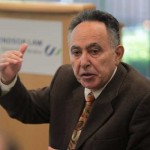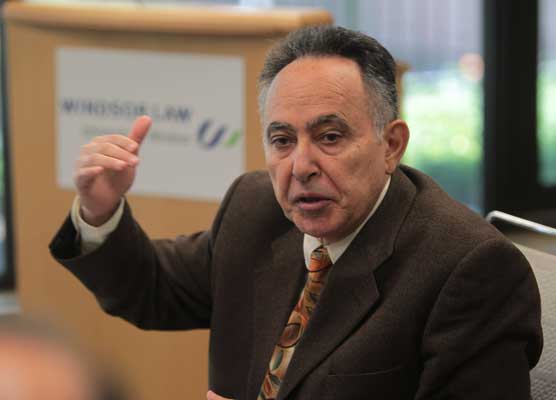 What’s shocking is not that Islamist currents have proven anti-democratic and anti-human rights, but how quickly they dropped the façade of the victim, writes Bahieddin Hassan
What’s shocking is not that Islamist currents have proven anti-democratic and anti-human rights, but how quickly they dropped the façade of the victim, writes Bahieddin Hassan
“The security apparatus is not in the business of art, but in confronting criminal acts.” You may be surprised to know that the author of this quote isn’t a dispassionate observer, but a leader of a once persecuted group, whose members faced torture and abuse by security forces. It is Rachid Ghannouchi, the historical leader of Tunisia’s Al-Nahda movement and its current president, who often vocally criticised torture under the former regime, rejecting the justifications used by regimes in both Tunisia and Egypt, that the police were confronting terrorism that threatened the lives of millions. This isn’t an isolated shift in rhetoric after the revolution.
Since the Muslim Brotherhood assumed power in Egypt (controlling the presidency, the legislature and the cabinet), the human rights violations that sparked the revolution have continued, and in some cases, abuses have gotten even worse. Protests are violently suppressed on a daily basis, and in the past few months, more journalists and media personalities have been referred by the public prosecutor to investigation and trial on charges of insulting the president than during the entire 30 years under former president Mubarak. Judicial autonomy has received its most serious blows in 60 years. A new constitution has been adopted that for the first time in Egyptian history constitutionalises military trials for civilians. An NGO law is currently under consideration that will effectively nationalise civil society and decimate human rights NGOs. Meanwhile, supporters and leaders of the ruling party have publicly assaulted protesters, surrounded Media Production City physically, assaulting media professionals and set siege to courts in an attempt to influence their judgements or impede their deliberations, as was the case at Egypt’s highest court, the Supreme Constitutional Court, while the president and his cabinet sit in complicit silence. But the president did not maintain this silence when 40 people were killed over two days in January in Port Said and Suez — instead he expressed his appreciation for the police and urged them to act even more decisively. Ironies abound in this climate.
Perhaps most astonishing is the fact that before the partisans of the ruling party tortured protesters near the walls of Al-Ittihadiya presidential palace last December, they first gathered at a nearby mosque to perform their prayers. Similarly, on 22 March, after completing Friday prayers, members and supporters of the ruling party again tortured victims, this time in a Muqattam mosque. The Quran says, “Then, when prayer is finished, scatter in the land and seek God’s bounty, and remember God frequently; haply you will prosper,” (62:10). Does torture bring us closer to God? Do their “prayers” not forbid “indecency and evil?” (29:45) Or, is it just that the interpretation of the Quran changes when the victim became the oppressor?
Yet the violent crimes committed at Al-Ittihadiya palace and Muqattam have not been investigated by the prosecutor-general, while he diligently focuses on cases of insult and verbal defamation. The acts of violence defame and insult Islam more than Bassem Youssef and others could ever do with mere words.
In a speech on 6 April in Sudan, the president said that he intends to launch “a second revolution” to achieve the objectives of the “renaissance project”. The question is a revolution against whom, and using what means? When security and legislative repression — the regime’s chosen tactics — fail, what kind of revolution could remove the perceived obstacles to the Muslim Brotherhood project? Is it a revolution or a massacre?
IN DEFENCE OF THE OPPRESSORS: I have spent nearly half my life defending human rights, and most of that time defending the rights of Islamists in Egypt and the Arab world. Not for a moment did I hold illusions about the authoritarian tendencies of many of those whose rights I defended, whether they belonged to groups described as moderate like the Muslim Brotherhood, or as terrorists like assorted jihadists. In fact, at times I suspected that some of them may have committed, or been party to, the alleged murders, but like other human rights defenders around the world, I defend values and principles that stand above politics and personal inclinations. Every person, even criminals and murderers, must be treated humanely.
Defending the humanitarian rights of suspected terrorists — ie those who are suspected of perpetrating or inciting human rights violations — was a significant source of conflict within the first Egyptian human rights NGO, the Egyptian Organisation for Human Rights (EOHR), in the 1980s. Most EOHR trustees did not wish to engage with these cases as human rights violations, preferring EOHR to focus on violations of freedom of expression and belief, women’s rights and minority rights. I strenuously opposed this. When the board democratically consulted with the organisation’s members in mid-1988, an overwhelming majority, most of them secularists, supported defending the human rights of even suspected terrorists or instigators of attacks on human rights.
Defending Islamists was also a source of constant tension with the Egyptian regime and its security apparatus, sometimes leading to direct confrontation. This was one reason the regime refused to grant legal status to EOHR for 17 years, five years of which (1988-1993) I served as secretary-general. After moving to the Cairo Institute of Human Rights Studies (CIHRS) in 1994, a prominent presidential advisor invited several human rights groups to a private meeting in his office, among them the CIHRS. The primary, if not sole, message of the meeting was that rights groups should stop engaging in what the advisor considered to be support for political Islamists. There was not one Islamist at that meeting or on the board of any organisation in attendance. Attendees were all secularists, among them a group specialising in the defence of Coptic rights. Nonetheless, all those present rejected the president’s message and attempted to convince his advisor that their organisation’s defence of human rights does not represent equal political support, even if some Islamist groups used this moral support to garner political support domestically or internationally.
In 2006, I contributed to a book published in the US about human rights in the Arab world. In the chapter entitled “Defending Islamists as a Question of Ethics”, I explained the rationale behind my staunch defence of Islamists, all the while expressing profound scepticism about the potential for a coherent, pro-human rights, democratic trend evolving within that generation of political Islamist movements in Egypt, in comparison to the positive developments within leftist and Nasserist currents at the time.
THE OPPRESSOR SHEDS THE VICTIM’S MASK: So I am not surprised by the authoritarian, anti-human rights, and anti-democratic streak in the Muslim Brotherhood and other political Islamist groups. However, I was shocked by how quickly the face of the oppressor revealed itself. Franz Fanon and others examined the process by which the victim becomes the oppressor. What happened with these groups isn’t a transformation, but rather a process of slipping off the mask of victimhood to reveal the true persecutor underneath. In the hours I spent listening to and documenting testimonies, I observed that the “victims” were often unable to hide the oppressor lurking within. At times, their words carried veiled threats against me personally. It isn’t the monster under the mask that surprises me, but rather the fact that the façade was shed so quickly.
I am shocked that only a few months after reaching power, the former victims began publicly disavowing the human rights NGOs that had defended them, shamelessly reproducing the rhetoric of their own persecutors — the Mubarak regime — to attack civil society NGOs as “potential tools for foreign money.”. Before the revolution, Islamist leaders had no objections when Egyptian human rights NGOs exposed human rights violations in international forums or Western countries. Now, however, having become no longer a victim but a tyrant, the Muslim Brotherhood has reclassified such critique as interference in domestic affairs.
Similarly, they didn’t refused funds from foreign sources when it was spent in defence of their colleagues. A prominent Muslim Brotherhood member and former parliamentarian boasted that he had argued with Fathi Sorour himself, the former speaker of the People’s Assembly, because Sorour did not distribute a memo from the CIHRS to members of parliament. Of course, he voiced his objection because a section of the memo served the interests of the Muslim Brotherhood. In contrast, recently, Brotherhood leaders told international organisations that Egypt after a successful revolution no longer needs NGOs to defend human rights.
The shift in position makes perfect sense since all oppressors do their best to avoid exposure of their crimes and prevent their victims’ voices from being heard. Unfortunately, this has become the foundation of the new and bloody alliance between the Muslim Brotherhood and a wing of the security apparatus. The Muslim Brotherhood seeks to consolidate power at any price, even at the price of aligning themselves with an enemy that persecuted them for nearly a century.
I have no regrets. If I could go back 25 years, I would do the same thing without hesitation. I feel pity for them and contempt for the levels of “ethics” to which human beings can sink.
The writer is director of the Cairo Institute for Human Rights Studies (CIHRS). This article is part of the introduction to the CIHRS annual report on human rights in the Arab world, to be issued this month.
- this article was published at Al-Ahram Weekly newspaper in 9 April 2013
http://weekly.ahram.org.eg/News/2197/21/From-tortured-to-tyrant.aspx
Share this Post

